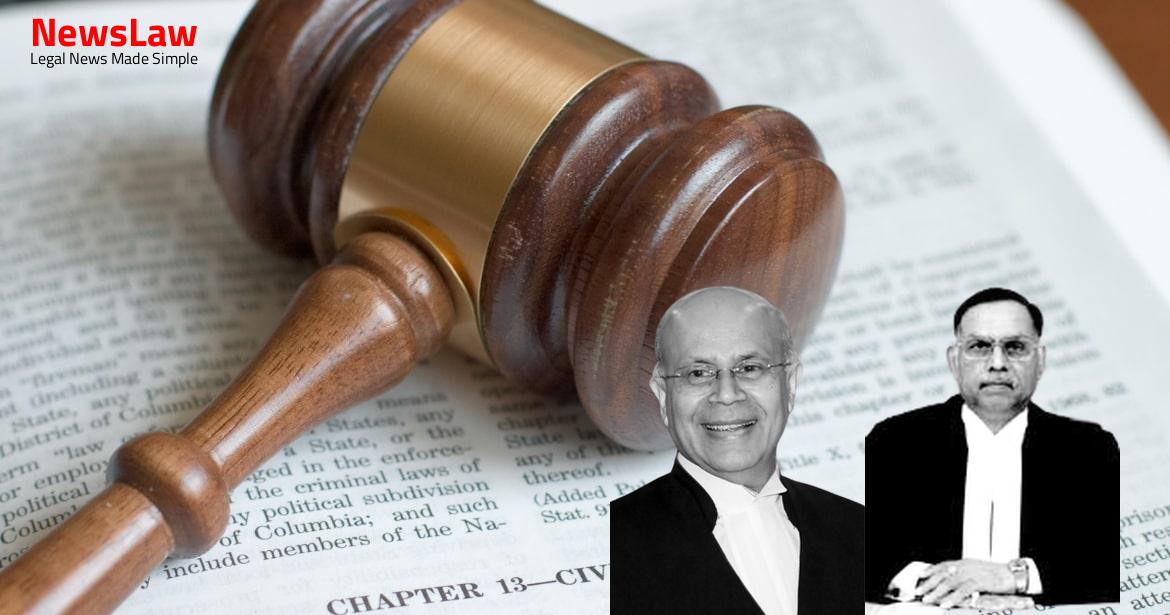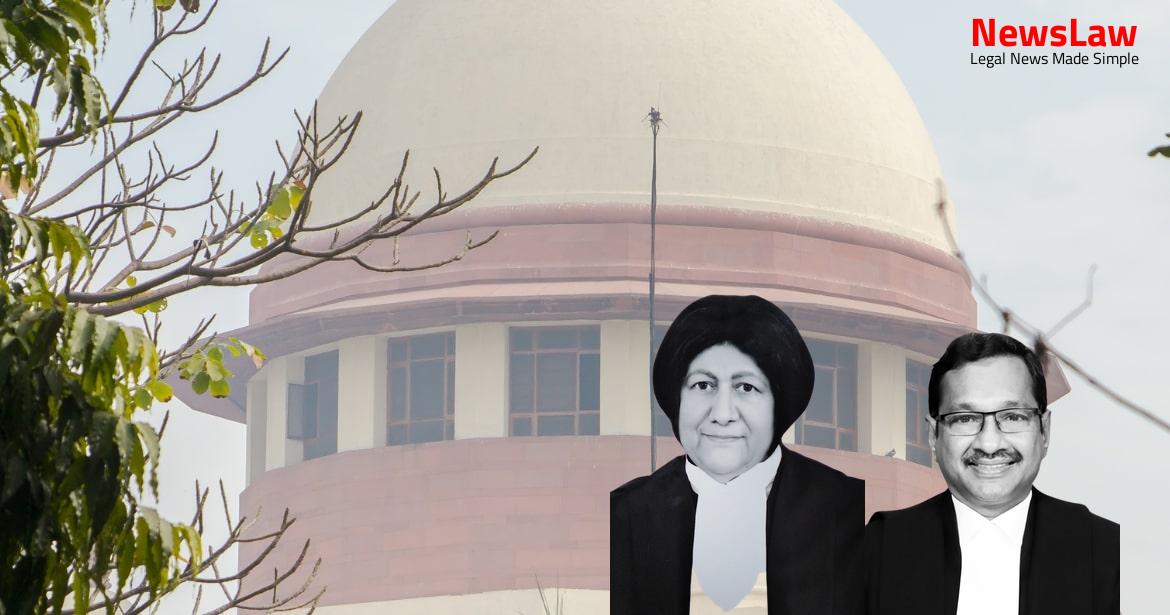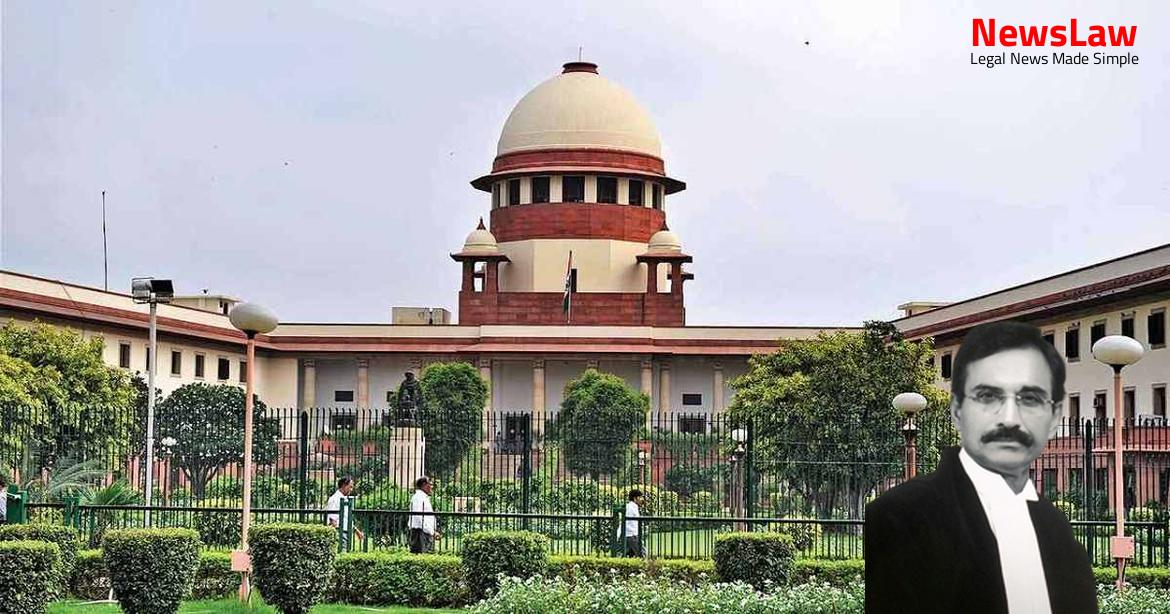In the landmark case of Mohan Singh v. Jaipal Singh, a significant legal battle over land rights was resolved by the Supreme Court of India. The dispute between the petitioner, Mohan Singh, and the respondent, Jaipal Singh, has far-reaching implications for the interpretation of land tenure laws. The judgement provided critical insights into the application of the 1953 Act and the subsequent 1972 Act, impacting the rights of landowners and purchasers. Let’s delve into the details of this complex legal saga.
Facts
- Jaipal Singh, a landholder, owned 221.72 standard acres of land in village Kheri, Shishgarh on 15.04.1953.
- The Punjab Security of Land Tenures Act, 1953 defined permissible area, standard acre, and surplus area.
- The Collector determined 191.72 standard acres of land as surplus in the hands of Jaipal Singh.
- Jaipal Singh executed sale deeds in favor of Mohan Singh for an area of 125 Kanal and 8 Marla on 18.06.1974.
- Mohan Singh filed an appeal against a notice to vacate the land and the prescribed authority rejected his application observing the purchase of surplus area by registered sale deed.
- Various orders and appeals were filed pertaining to the surplus land issue, leading to remand, remittance, and final orders.
- The legal heirs of the subsequent purchasers filed an appeal challenging the judgement of the Division Bench of the Punjab and Haryana High Court.
- Prescribed authority has no jurisdiction to challenge or modify orders passed by the Collector.
Also Read: Interpretation of Lease Agreement and Compulsory Registration
Issue
- The issue at hand involves whether the appellants and their predecessors-in-interest were entitled to the benefit of Section 8(3) and 9(3) of the 1972 Act.
- These sections required the landowner to first include his own land in the surplus pool before transferring land to be included in the surplus pool.
- The 1972 Act was enacted to give effect to agrarian reforms in independent India, specifically in Punjab.
- Under Section 2 of the Act, various terms and expressions were defined, including the Permissible Area for landowners or tenants.
- Permissible Area was defined as 30 standard acres initially, which could be converted to 60 acres.
- The interpretation and application of these sections are crucial for determining the rights of the appellants and their predecessors-in-interest.
Also Read: Enhancing Compensation and Modifying Sentences: A Legal Analysis
Arguments
- The big land owner had cheated the predecessor in interest of the appellant by misrepresenting that the land sold was not part of the surplus area and would not be included in the surplus pool.
- The selection of the surplus pool must adhere to the provisions of the 1972 Act, and any selection made contrary to these provisions is deemed null and void.
- According to a Full Bench judgment of Punjab and Haryana High Court, a sale can only be voided by the State but remains valid and binding between the vendor and vendee.
- The predecessors-in-interest of the appellant purchased land in 1974 and are entitled to benefits under Sections 8(3) and 9(3) of the 1972 Act, ensuring proper inclusion in the surplus pool.
- Challenging the declaration of the land as surplus in the hands of Jaipal Singh and not seeking a reduction in the surplus pool.
- The interpretation of Section 33 of the 1972 Act should be in favor of the beneficiaries of the act to protect their interests.
- The landowner who sold the land in 1974 under false representation cannot later include the same land in the surplus pool, depriving the vendee of their rightful claim.
- The appellants were not bonafide purchasers as they bought the land much after it was vested in the State Government.
- The sale deed obtained by Mohan Singh after the commencement of the 1972 Act was considered void.
- Section 8(3) of the 1972 Act cannot be applied by the appellants as Section 33(2) of the same Act specifies that pending proceedings under the 1953 Act must be continued and disposed of according to the older Act.
- The expression ‘determination of surplus land’ does not include the selection of land by the landowner to be put in the surplus pool, as argued by the appellant.
- Section 33(2)(ii) of the 1972 Act creates a deeming fiction which delays the application of the new Act until proceedings under the old Act are concluded.
- The learned Single Judge’s interpretation was deemed correct, and the Division Bench erred in allowing the appeal.
Also Read: SPML Infra Limited vs. Govt. of Arunachal Pradesh
Analysis
- The Full Bench judgment of the Punjab and Haryana High Court was considered regarding transfer in contravention under Section 19A of the 1953 Act.
- Section 19A prohibited the acquisition or possession of land exceeding the permissible area.
- The proceedings for determination of surplus land initiated under the 1953 Act were to be continued as if the 1972 Act had not been passed, as per Section 33(2)(ii).
- The interpretation of Section 33(2) by the Court emphasized continuing proceedings under the old Act if initiated before the 1972 Act came into force.
- The definition of ‘surplus area’ under the 1953 Act indicates that the selection of permissible area by the landowner is part of the surplus area determination process.
- Contrary to appellant’s argument, the selection of permissible area is indeed covered under the determination of surplus area as per Section 2(5a) of the 1953 Act.
- The submission that Section 8(3) and 9(3) should be applicable due to the selection process not being part of surplus area determination was rejected by the Court.
- A case law example of Chet Ram v. Amin Lal was cited to illustrate that transfers in contravention of the 1953 Act were void by the State but valid between the parties involved.
- Any person transferring or disposing of land after the appointed day in violation of sub-section (1) will have the transferred land considered as owned by that person for calculating permissible area.
- If the area left after transfer equals the surplus area, the entire remaining area will be deemed surplus. If the remaining area is less, the deficiency will be deemed surplus along with the transferred land.
- Repeal of the mentioned Acts does not affect certain proceedings like land purchase applications and surplus area determinations.
- The selection of permissible area by a person must include transferred land after the appointed day and land mortgaged without possession.
- Declarations regarding permissible area shall be made by specific individuals or guardians as per the case.
- Persons holding land exceeding the permissible area must declare their land holdings and make selections within a specified period.
- In case of armed forces members, a specific deadline applies for submitting declarations.
- Adult sons living separately must file declarations and make selections separately from their parents.
- The selection of land by a person must be distributed among transferees as per the proportion of land transferred to them.
- Transfer in contravention of Section 19-A(1) void only qua the State for the purposes of the Punjab Act.
- Transfer valid and binding between the parties inter se.
- Overruling of Labh Singh’s case 1971 Cri LJ 719 and approval of Godhu’s case 1979 PLJ 496.
- Order dated 15-12-1961 quashed, directing determination of surplus land as per Jagan Nath v. State of Punjab.
- Reference to judgment in Bhagwati Devi versus State of Haryana and others 1994 Supp (3) SCC 101.
- Final settlement of interpretation of Section 33 in Jiwas Das (DEAD) through LRS. versus Financial Commissioner, Revenue, Haryana and others 1998 (8) SCC 740.
- Appellant cannot raise the submission of fraud played on Mohan Singh as it was not pressed in the High Court.
- Limited submission before the Single Judge was regarding the entitlement to Section 8(3) of the Haryana Act.
- Mohan Singh, the predecessor-in-interest of the appellant, should have established the plea of fraud during his lifetime.
- Appellant purchased the land when Mohan Singh’s claim was rejected and the land was included in the surplus pool.
- Singh was entitled to the benefit of Section 8(3) of the 1972 Act.
- Therefore, appellant cannot raise the issue of fraud played on Mohan Singh by the landowner.
Decision
- The Division Bench of the Punjab and Haryana High Court did not commit any error in allowing the LPA of the respondents.
- The Single Judge was incorrect in holding that provisions of Section 8(3) of the 1972 Act applied in the present case.
- The competent authority does not need to ensure that the transferred area is first included in the permissible area of the land owner.
- The Division Bench was right in setting aside the direction of the Single Judge and restoring the order of the Financial Commissioner.
- The appeal was found to lack merit and was therefore dismissed.
Case Title: KIRPAL SINGH Vs. KAMLA DEVI (2020 INSC 97)
Case Number: C.A. No.-000356-000356 / 2020



